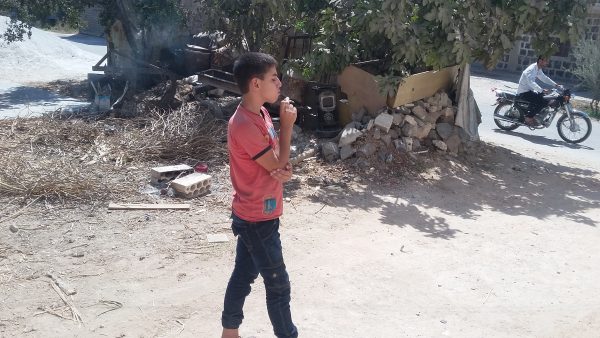Syrian Kids are Taking Up Smoking

Wissam, 12, lights a cigarette and smokes it with obvious enjoyment, despite his hacking cough.
His 37-year-old mother Manar says she has repeatedly tried to stop him from smoking, but to no avail.
“Wissam wants to prove to people around him that he is a man, after his father died during the bombing of Maarat al- Numaan city in 2016,” she said. “I don’t understand what’s going on, but all I can say is that we lead difficult lives now and I have no authority over my sons.”
Smoking is becoming increasingly popular amongst children and adolescents in the city of Idlib and its countryside, with parents and educators warning that psychological pressure and family issues caused by the war are the main drivers behind this phenomenon.
“I had to rely on Wissam after the death of his father,” said Manar, describing how her young son had begun smoking. “He became our only provider, so he started working at a blacksmith workshop, to feed the family. But I was surprised to see him one day smoking a cigarette immediately after he got home from work.”
She continued, “I scolded him and warned him about the dangers of smoking, especially as he was just a young kid. However, he answered that he was no longer a child and was now a man after the death of his father. As the breadwinner, he was entitled to the same things adults were… so he had the right to smoke.”
While Wissam makes enough money to buy his own cigarettes, 13-year-old Hayyan relies on his mother to feed his habit.
With no job, he sits in front of his house all day smoking one cigarette after the other. His mother Radiya, 38, said that while she knew smoking was a bad habit, she felt she had no choice but to give her son money for cigarettes.
“I found myself compelled to do that as he started borrowing money to buy cigarettes and even tried to steal money to be able to smoke,” she said, adding that no-one in the family had influence over Hayyan anymore.
His father travelled to Germany in 2013 and had not been heard of since. Radiya is the sole provider for her three sons, working at a daycare centre to support them.
Even teachers say that they have lost all authority over students who want to smoke. Ikhlas, a 28-year-old teacher, recalls her shock the first time she saw a group of children smoking in the school playground in plain sight. She angrily told the children to come to school with their parents the next day.
Ikhla thought this would scare them, but instead some began to laugh.
One of the children, whose father was a leader in one of the armed factions, told her, “I’m afraid my dad will come to school and fire you or transfer you to another school.”
Othman Moamar, a 32-year-old psychologist, agreed that a number of social issues meant that smoking had become more widespread among children.
“The war in Syria just made it easy for this issue to grow. Children and young people start to smoke nowadays because they want to imitate adults, or because they hang out with bad role models, or due to the lack of control over tobacco sales,” he said.
“Family problems, such as divorce or the absence of a breadwinner, leads to a lack of parental authority and can result in delinquency. Based on recent observations, one in six children in northern Syria smokes, and this is a frightening figure,” Moamar continued.
He said that parents needed to invest in their relationships with their children as a way of discouraging smoking and other antisocial behaviours.
“It’s imperative to discuss sensitive issues in a way that does not cause fear of punishment among children. It is also important that parents are role models for their children regarding smoking, that they build their children’s confidence and find out what is bothering them in order to solve any issues they might have,” he said, adding that it was important to both protect children from bad influences and to encourage them to participate in educational activities.
Mansour al-Mohammad, a 48-year-old pediatrician, noted that smoking amongst juveniles could lead to a range of serious long-term consequences.
“Smoking has an extremely detrimental effect on children’s health including asthma, respiratory system diseases, pneumonia, bronchitis and other diseases of the ear, nose, and throat, and can even lead to sudden death syndrome,” he said. “This phenomenon should be immediately addressed through awareness-raising campaigns, particularly in schools and educational centres, to teach children about the dangers and health risks of smoking.
“Local councils should start fulfilling their responsibilities towards children and youth by providing recreational facilities where they can channel their physical and psychological energy, and play and have fun with their peers,” he concluded.
Sometimes these forums can have a considerable impact. Twelve-year-old Yaman al-Karkas says that he decided to quit smoking for good after attending an awareness-raising session.
He said, “I will not put my health at risk just to imitate others.”
